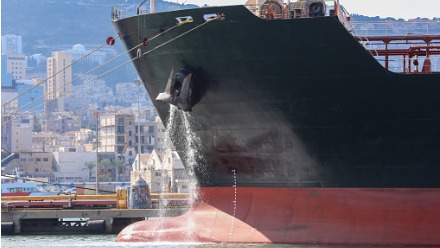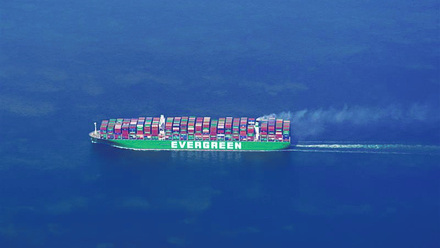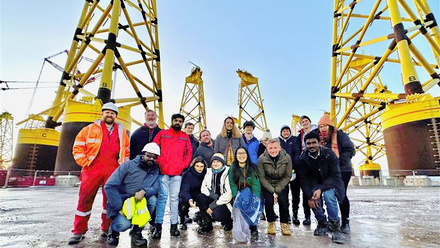Vessel fires and geopolitical risks a worry for marine insurance sector
Although the industry is in good health according to a new report, issues in the Red Sea, decarbonisation and the increase in large vessel fires remain major issues for insurers, shipping organisations and seafarers alike.
Marine underwriters experienced a “positive” 2023 with “market development seen across all lines of… business”, according to the International Union of Marine Insurance (IUMI) 2024 Stats Report, published in October 2024.
Citing 2023 data, the report noted the favourable influences of a growing world trade, oil prices stabilising, easing inflationary pressures and falling interest rates.
However, the report also noted large vessel fires remained a “growing concern” in 2024 alongside evolving geopolitical tensions – particularly, continuing Houthi attacks in the Red Sea and the Russia/Ukraine war. Additional contemporary headwinds cited included the impact of the United States election, “climate change and associated extreme weather events, zero-carbon fuel technology and cyber-risks”.
Describing a relatively moderate claims environment in the report, IUMI Chief Analyst Veith Huesmann nonetheless notes the “uncertainties” posed by influences such as geopolitical tensions and cites onboard fires, specifically in terms of electric vehicle (EV) transportation, as being a concern.
“Due to the potential of thermal runaway, fires in EVs need to be dealt with differently from fires in conventional vehicles and vessel operators and their crews need to be properly trained and equipped,” Huesmann says.
“This becomes increasingly important when we look at the development of exported EVs from China. Fires might not lead the ranking of the frequency of claims, but their severity can be devastating.
“With a world currently in a state of flux, geopolitical tensions will also, inevitably, impact marine insurers. High-risk zones present challenges to vessel operators who either choose to continue to transit these areas or reroute and take a longer voyage. Each presents its own set of risks. To date, insurers have continued to offer adequate cover for both options.
“With administrative changes in a number of countries and an increasing trend towards protectionism there will be many future uncertainties surrounding global trade which, in turn, will impact shipping and its associated services including insurance.”

Half of Red Sea voyages rerouted
Commenting on matters raised in the report, an International Chamber of Shipping (ICS) spokesperson confirms that about 50% of intended Red Sea voyages were currently being rerouted.
“However, ships continue to transit the route, in compliance with best practice guidance, demonstrating the resilience of shipping in the face of security risks,” states the spokesperson.
Also sharing concerns regarding lithium battery fires, the spokesperson said the ICS was actively collaborating with International Maritime Organization (IMO) work on the issue. “In addition, ICS has co-authored industry guidance together with the International Group of P&I Clubs, which aims to improve the safety of vehicle carriage through best practice,” they add.
Moving on to the shipping sector’s need to reduce greenhouse gas (GHG) emissions and transition to alternative fuels, the spokesperson explains the ICS is encouraging a “collaborative and pragmatic approach” that did not prioritise any single fuel or technology.
“It is clear that no single solution currently meets the scale, safety and operational requirements of global shipping. The key challenge is to rapidly create both demand and supply for viable alternative fuels, ensuring they are safe, economically sustainable and globally available.
“Ultimately, any shift to new fuels will require that fuels are available – we are no longer just in competition with other industrial sectors for the new fuels, we are now in competition for the green electrons used by the tech sector.”
The spokesperson observes that “much more work” was needed from governments before the IMO’s net zero framework would be ready to be approved at April’s “critical” Marine Environment Protection Committee (MEPC) meeting.
“A universal GHG contribution system is the best chance the shipping industry has to meet the IMO net zero GHG emissions target by or around 2050. We are pleased that our concept of a universal GHG contribution by ships, per tonne of CO2e emitted, remains firmly on the table at IMO.”

Human cost should be remembered
Bringing a seafarer’s perspective, International Transport Workers’ Federation (ITF) Seafarers and Inland Navigation Section Coordinator Fabrizio Barcellona says crews “continue to pay the price for geopolitical conflict across the globe”.
“To date, there have been more than 70 attacks on ships by the Houthis since November 2023, with two vessels sunk and one seized,” he states.
“The human cost also includes three seafarers killed aboard the True Confidence in March, one killed on the Tutor in June, and 25 crew taken hostage when the MSC Aries was seized by Iranian Revolutionary Guards in the Straits of Hormuz in April.”
Although, Barcellona adds that “many” seafarer lives had been protected by the ITF’s successful engagement with the maritime industry via the International Bargaining Forum (IBF) Warlike Operations Area Committee (WOAC).
He says seafarers are being negatively impacted by various other rising influences: “Seafarers face significant dangers when dealing with lithium batteries, including increased risk of fire onboard vessels compared to 2023.
“There are still significant training gaps for seafarers in managing battery-specific fire risks. We are urgently calling for updated regulations and better training for ships carrying electric vehicles and battery goods in containers.”
In regard to climate change, Barcellona emphasises that seafarers witnessed the impacts “every day” and were “extremely concerned” that the industry was not acting quickly enough.
“Huge changes are needed to swiftly switch the shipping industry away from fossil fuels as part of a just transition,” he concludes.
“This has ramifications for seafarer training. As our joint work as part of the Maritime Just Transition Task Force shows, around 800,000 seafarers will need training by the mid-2030s in order to safely handle zero-carbon fuels.
“As the maritime industry moves towards reducing GHG emissions, there is a critical need to explore alternative fuels. The shipping industry’s response must put seafarers at the heart of the solution. Seafarers can’t just be an afterthought when it comes to decarbonisation efforts, and training should be seen as part of a sensible investment in professionalisation rather than just a cost or burden for companies.”
Join IMarEST’s Human Element Special Interest Group to help improve safety in the maritime industry.
Main image: burning ship and fireboat; credit: Shutterstock.
Inline images: Veith Huesmann, IUMI Chief Analyst; credit: IUMI, Fabrizio Barcellona, ITF Seafarers and Inland Navigation Section Coordinator; credit: ITF.
Tell us what you think about this article by joining the discussion on IMarEST Connect.





